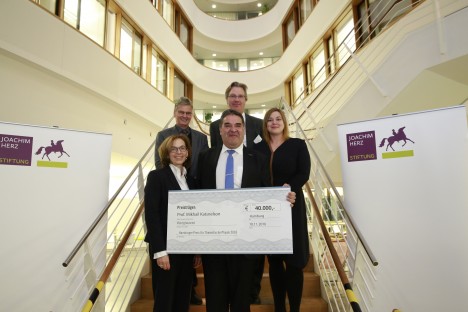Today Russian physicist Mikhail Katsnelson has received the Hamburg Prize for Theoretical Physics. Since 2010 the prize is jointly awarded by the CUI and the Joachim Herz Stiftung. Katsnelson carries out research in the fields of quantum many-body-theory, strongly correlated systems, the quantum theory of magnetism as well as graphene. His works on graphene, in particular, are widely regarded as pioneering. Graphene has a very high conductivity and is an easily processable two-dimensional carbon. It opens up potential applications in solar cells, touch screens or computer chips. All these devices can be made more flexible and efficient by using graphene.

Prize ceremony in the Center for Free-Electron Laser Science (from left): Andrea Pauline Martin, Vice Chairwoman of the Joachim Herz Stiftung, Prof. Jan Louis, Vize President of Universität Hamburg, Prof. Mikhail Katsnelson, Radboud University Nijmegen, Laudator Prof. Olle Eriksson, Uppsala University and Katharina Fegebank, Second Mayor and Senator of Science, Research and Equality. Credit: Claudia Höhne
Katsnelson is a professor at Radboud University in Nijmegen, where he is head of the group for theory of condensed matter. As the recipient of this year’s Hamburg Prize of Theoretical Physics, he will spend time in Hamburg and be involved in research and teaching. The award comes with a prize of 40,000 EUR.
“I congratulate you wholeheartedly on the prize. I am convinced that your colleagues as well as the students in Hamburg will greatly benefit from their exchange of ideas with you”, said Andrea Pauline Martin, deputy Chairperson of the Board of the Joachim Herz Stiftung, during the ceremony.
Scientists and students at CUI are looking forward to Katsnelson’s stays in Hamburg with great expectation. “His versatile interests offer many links to our research. We are very much looking forward to Mr Katsnelson’s time spent in Hamburg. I am sure that he will make an enormous impact on our work, for instance in the fields of superconductivity and correlated systems, said Prof. Alexander Lichtenstein from the Institute of Theoretical Physics at Universität Hamburg.
“I am delighted by this honor, and I am very keen on getting to know better the research groups in Hamburg. I hope that we can initiate challenging new projects,” said Katsnelson in his acceptance speech.
The Hamburg Prize for Theoretical Physics was awarded to the Russian Physicist by Hamburg’s Second Mayor and Senator for Science Katharina Fegebank: “Physics research in Hamburg has an excellent international reputation. With this prize, the Joachim Herz Stiftung contributes to this reputation. The format of the prize fosters new collaborations between top researchers over the world, from which in particular the young researchers at CUI draw enormous benefits. On behalf of the City of Hamburg I’d like to express our thanks to the cluster of excellence CUI and the Joachim Herz Stiftung,” said Fegebank.

